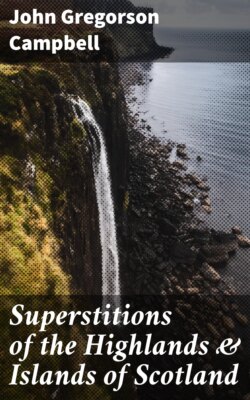Читать книгу Superstitions of the Highlands & Islands of Scotland - John Gregorson Campbell - Страница 12
На сайте Литреса книга снята с продажи.
FAIRY RAIDS.
ОглавлениеTable of Contents
The Gaelic belief recognizes no Fairyland or realm different from the earth’s surface on which men live and move. The dwellings are underground, but it is on the natural face of the earth the Fairies find their sustenance, pasture their cattle, and on which they forage and roam.
The seasons on which their festivities are held are the last night of every quarter (h-uile latha ceann ràidhe), particularly the nights before Beltane, the first of summer, and Hallowmas, the first of winter. On these nights, on Fridays, and on the last night of the year, they are given to leaving home, and taking away whomsoever of the human race they find helpless, or unguarded or unwary. They may be encountered any time, but on these stated occasions men are to be particularly on their guard against them.
On Fridays they obtrusively enter houses, and have even the impudence, it is said, to lift the lid off the pot to see what the family have on the fire for dinner. Any Fairy story, told on this day, should be prefixed by saying, ‘a blessing attend their departing and travelling! this day is Friday and they will not hear us’ (Beannachd nan siubhal ’s nan isneachd! ’se ’n diugh Di-haoine ’s cha chluinn iad sinn). This prevents Fairy ill-will coming upon the narrator for anything he may chance to say. No one should call the day by its proper name of Friday (Di-haoine), but ‘the day of yonder town’ (latha bhatl’ ud thall). The Fairies do not like to hear the day mentioned, and if anyone is so unlucky as to use the proper name, their wrath is directed elsewhere by the bystander adding ‘on the cattle of yonder town’ (air cro a bhail’ ud thall), or ‘on the farm of So-and-so,’ mentioning anyone he may have a dislike to. The fear of Fairy wrath also prevented the sharpening of knives on this day.
They are said to come always from the west. They are admitted into houses, however well guarded otherwise, by the little hand-made cake, the last of the baking (bonnach beag boise), called the Fallaid bannock, unless there has been a hole put through it with the finger, or a piece is broken off it, or a live coal is put on the top of it;7 by the water in which men’s feet have been washed; by the fire, unless it be properly ‘raked’ (smàladh), i.e. covered up to keep it alive for the night; or by the band of the spinning wheel, if left stretched on the wheel.
The reason assigned for taking water into the house at night was that the Fairies would suck the sleeper’s blood if they found no water in to quench their thirst. The water in which feet were washed, unless thrown out, or a burning peat were put in it, let them in, and was used by them to plash about in (gan loireadh fhéin ann) all night. Unless the band was taken off the spinning wheel, particularly on the Saturday evenings, they came after the inmates of the house had retired to rest and used the wheel. Sounds of busy work were heard, but in the morning no work was found done, and possibly the wheel was disarranged.8
On the last night of the year they are kept out by decorating the house with holly; and the last handful of corn reaped should be dressed up as a Harvest Maiden (Maighdean Bhuan), and hung up in the farmer’s house to aid in keeping them out till next harvest.
